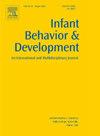明确自闭症儿童手势与后期词汇的发展关系
IF 2
3区 心理学
Q3 PSYCHOLOGY, DEVELOPMENTAL
引用次数: 0
摘要
手势既是一种交流工具,也是一种词汇学习工具,正常发育的儿童一直表明,早期的手势与后来的词汇技能呈正相关。然而,许多自闭症儿童在手势和词汇技能方面都经历了延迟和挑战,研究也显示了手势和词汇的混合关联;因此,目前尚不清楚自闭症儿童的手势是否支持新出现的词汇技能。为了解决之前相互矛盾的发现,目前的概念复制研究使用线性模型,对12至24个月大的英语喂养的婴儿进行大样本(N = 451),以调查手势是否与表达性和接受性词汇有关。采用婴儿-兄弟姐妹设计,研究了三组儿童的手势-词汇关联和群体调节:后来符合自闭症标准的自闭症儿童的婴儿-兄弟姐妹(HL-ASD, n = 73),不符合自闭症标准的婴儿-兄弟姐妹(HL-Neg, n = 238),以及没有自闭症家族史的对照组(HL-Neg, n = 140)。l - neg和HL-ASD组在12个月大的手势和18个月大的接受性词汇之间都表现出正相关;然而,只有l -阴性组显示出12个月大的手势和18个月大的表达性词汇之间的正相关。对于12个月大的手势和24个月大的接受性和表达性词汇,LL-Neg组和HL-Neg组表现出正相关,而HL-ASD组则没有。同样,LL-Neg组和HL-Neg组在18个月大的手势和24个月大的词汇量之间表现出正相关,但HL-ASD组没有。总体而言,LL-Neg组在所有测试模型中都显示出显著的手势-词汇关联,而HL-ASD组只显示出一个显著的正相关。本文章由计算机程序翻译,如有差异,请以英文原文为准。
Clarifying the developmental association between gesture and later vocabulary for autistic children
Gestures serve as both a communication and a word-learning tool, with typically developing children consistently showing that early gestures are positively associated with later vocabulary skills. However, many autistic children experience delays and challenges in both gesture and vocabulary skills, and studies also show mixed gesture-vocabulary associations; thus, it is unclear whether gestures in autistic children support emerging vocabulary skills. To address previous conflicting findings, the current conceptual replication study uses linear models with a large sample (N = 451) of 12- to 24-month-old English-raised infants to investigate whether gestures are associated with expressive and receptive vocabulary. Using the infant-sibling design, gesture-vocabulary associations and group moderation were investigated in three groups: infant-siblings of autistic children who later meet the criteria for autism themselves (HL-ASD, n = 73), infant-siblings who did not meet criteria for autism (HL-Neg, n = 238), and a control group without a family history of autism (LL-Neg, n = 140). Both LL-Neg and HL-ASD groups showed positive associations between 12-month gestures and 18-month receptive vocabulary; however, only the LL-Neg group showed a positive association between 12-month gestures and 18-month expressive vocabulary. For 12-month gestures and 24-month receptive and expressive vocabulary, the LL-Neg and HL-Neg groups showed positive association, whereas the HL-ASD group did not. Similarly, the LL-Neg and HL-Neg groups showed positive associations between 18-month gestures and 24-month vocabulary, but the HL-ASD did not. Overall, the LL-Neg group showed significant gesture-vocabulary associations across all tested models, while the HL-ASD only showed one significant positive association.
求助全文
通过发布文献求助,成功后即可免费获取论文全文。
去求助
来源期刊

Infant Behavior & Development
PSYCHOLOGY, DEVELOPMENTAL-
CiteScore
4.10
自引率
4.80%
发文量
94
期刊介绍:
Infant Behavior & Development publishes empirical (fundamental and clinical), theoretical, methodological and review papers. Brief reports dealing with behavioral development during infancy (up to 3 years) will also be considered. Papers of an inter- and multidisciplinary nature, for example neuroscience, non-linear dynamics and modelling approaches, are particularly encouraged. Areas covered by the journal include cognitive development, emotional development, perception, perception-action coupling, motor development and socialisation.
 求助内容:
求助内容: 应助结果提醒方式:
应助结果提醒方式:


